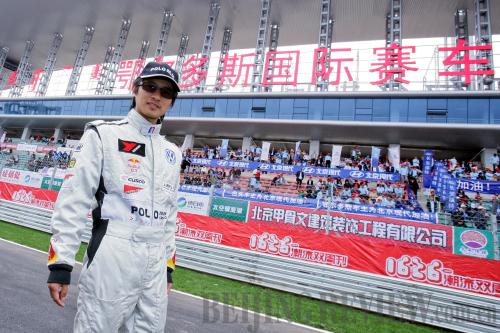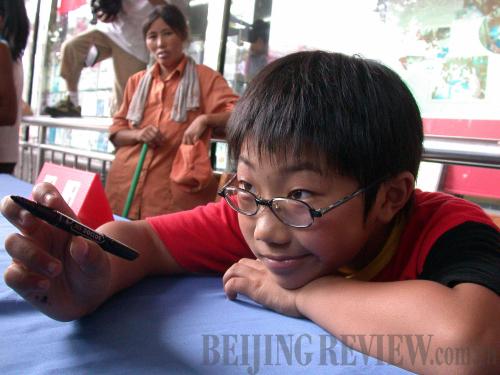|
"Writers of these novels failed to fully understand us, neither did they know our real thoughts. They described us the way they saw us to attract attention," Meng said.
Recently, Meng published a semi-autobiographical novel, Grow Up Like a Sunflower. After publishing her first work at the age of 11 in primary school and a collection of works last year, Meng said she feels she need to write a novel about the real post-90s generation and let people know the way they look at the world. Grow Up Like a Sunflower was the result. "
"We also have dreams and are ready to take responsibilities as long as adults are willing to listen to us and observe us," she said.
The post-90s readers think the same way. "Writers of our age can bring out the positive side of this group which is easily ignored by adults," said Wei Pengfei. "Although we may be anxious or depressed sometimes, we are far stronger than in people's imaginations and are not as selfish as people have assumed."
Another teenage writer Tang Chao published his second novel Give Me Back the Dream in January 2008 when he was 15 and it soon became a bestseller.
"We carry the family's dreams and the society's expectations. But who has given a thought to our dreams?" said Tang.
Fei Fei, a girl born in 1996, said the pressures the post-90s generation felt had squeezed the precious innocence out of children. "We were forced to listen to Mozart after we were born, taught to recite ancient poems when we began babbling, asked to play the piano at the age of four, sent to English courses at five. Who cared about our loneliness as the family's only child?" Fei said.
Cultivating talent
Works of teenage writers often question China's current educational system, giving their existence another point of significance.
Jiang's admission to Tsinghua University caused a number of disputes. At the time, she was admitted with a college entrance score 60 points lower than normal admissions. Also, she didn't perform well in writing during the examination.
 |
|
ALL-ROUNDER: In recent years, Han Han, as a successful writer, often appears as a professional race car driver (CFP) |
Jiang was not the first teenage writer to perform badly in examinations. In 2000, Han Han, who has just published his first novel Triple Door, only scored 60 points out of 100 in examination. He failed another seven courses and quit school. Now, the "Han Han phenomenon" is still widely discussed as to how young talent can be properly cultivated.
Han became famous as a middle school student when, in 1999, he won first prize in the first New Concept Writing Competition. The competition, which is still held, is called "the Olympics of Chinese." It not only gives children greater enthusiasm for writing but also helps the champions win fame. Most participants are children born after the implementation of the one-child policy in China during the early 1980s.
"They expressed the hope and pain of their generation," said writer Mo Yan. "These young writers are dying to be understood and loved. More importantly, they need to take care of themselves, their dreams and everything they believe in, and grow up."
Xi Minxia, another champion from the competition who later went on to take a Chinese major at Fudan University, says people give teenage writers much support.
"You can only have a chance to win the competition when you have truly expressed your real feelings. The competition has offered us a lot of opportunities and given us the freedom to express the characteristics of our generation."
"Writing is a common urge for children," said writer Yang Peng, who is the only Chinese writer the Walt Disney Company has hired to write stories about Mickey Mouse in China. "It's a true expression of their inner world and real life. Although they are a weaker group in society, they are entitled to express their inner thoughts."
While there are those who have demonstrated their talent in writing, others are worried they can't write. Yang Hong, a primary school teacher from Beijing, says not being able to write well is due to lack of creativity and also lack of observation and enthusiasm for life.
"It's positive for children to write. It can develop creativity and is a healthy way of life. Besides, they can release negative emotions through writing, which is good for their physical and mental well-being," said Wu. "Although not perfect, we should cherish the precious purity, innocence and imagination in their works, which will disappear when they grow older."
She is worried children lose their innocence after turning 15 and their words become the same as adults.
"Writing at an early age has existed since ancient times. The reason for its lack of popularity is adults seldom listen to their voices," said Yu Lei, Professor at Kunming University who studies children's writing. "Today's children and teenagers have an elevated starting point. They have access to lots of information and knowledge and they love to write. But they need good guidance. Publishing companies should cultivate teenage writers as if they were fragile crystals."
"Society plays an important role in encouraging teenage writers to keep writing," said Yang. "Some of them made a quick appearance in the industry and then disappear for good. Publishing houses seeking quick success are to blame in such cases."
 |
|
WRITING PRODIGY: Bian Jinyang published his first novel at age 9 and the oversea rights for the book are worth $150,000 (CNSPHOTO) |
Bian Jinyang published his first novel at nine and his work has been described as China's Harry Potter. Bian's mother once forced him to learn to play the piano, which he hated. When she saw her image as the tiger mother in Bian's novel, she realized forcing children to learn something they don't like can be harmful to a child's development. Now she knows interest is the best teacher.
Different from other teenage writers, Bian hasn't sacrificed his performance at school for writing. After his mother adopted a different way of bringing him up, Bian has been given more freedom to write and enjoys a better childhood. | 